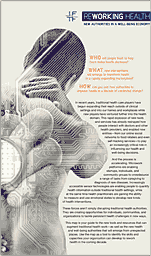Future Now
The IFTF Blog
Reworking Health: Uncovering Empowering Identities
Co-creating healthier narratives for improved outcomes
Over several decades, social epidemiologists have done amazing research on how our health is shaped by social and environmental factors totally outside of our control as individuals. (For instance, there is a very disturbing correlation between zip codes and life expectancy). The evidence for this is so strong that in 2010, the California Endowment, which is one the state’s biggest philanthropic health foundations, redirected its funding from individual-based to place-based health initiatives.
There are, of course, countless environmental factors that contribute to health outcomes—air quality, access to affordable and healthy food, and safety, to name a few. But there’s another factor that doesn’t get discussed quite as much, perhaps because it’s more difficult to quantify—how our environment impacts our sense of identity.
Our identity—who we believe ourselves to be, and how we understand our place in the world—has serious health consequences.
Nadine Burke Harris, who is well-known for her work on childhood trauma in Hunters Point here in San Francisco, said, in an interview with Greater Good that, for the kids she works with:
“The messages here daily, all the time, are that you are not important and you have no power. When you are exposed day after day to poor living conditions, violence, and environmental injustice, you start to feel like you are not important and that your voice is not being heard. And it’s easy to feel like you don’t have any power.”
These feelings can be really harmful to your health. There’s been significant research over the past several decades in the U.S. and the U.K. that links feeling powerless to poor health outcomes. But while, ultimately, all the conditions that disempower will have to be addressed, there are some surprisingly direct ways to make people feel more empowered—and in doing so, enhance their health.
For instance, researchers at Olin College and Northwestern, got 47 psychotherapy patients to write about their life as a story prior to beginning, and then throughout the course of, therapy, every session over 12 assessment points, in addition to concurrently completing a measure of mental health. The researchers then looked at this specific thematic ways in which their stories changed. And one of the key themes that they looked at, was the theme of “agency,” how much control and power people were giving to themselves as the protagonist of the story. They found that people who started to give themselves more agency, on average, showed improvements in mental health. And what’s key, is that these people started to see themselves as having more agency, before they got better. Which suggests that increased agency in these self narratives is not the byproduct of improved mental health, but the cause of it. Essentially, that creating a more empowered identity helped them get better.
We see this work in less direct ways as well. For instance, asthma sufferers who feel stigmatized are less likely to use their inhalers and suffer worse, and more costly, outcomes. Likewise, other studies have found that “hegemonic masculinity” (in the U.S.) is associated with “a variety of negative health behaviors,” meaning that, ironically, Men’s Health magazine might actually be bad for men’s health, because, though it contains tons of health advice, it also reinforces an identity that’s unhealthy.
In the next decade, we could see a new place in health for people who can effectively work with others to help them examine how their narrative identity—who they believe themselves to be as an individual or member of a community—impacts their health, then help them co-create a healthier, more empowered identity. And we already see examples of organizations activating narrative authority to do this outside of healthcare.
For instance, PhotoVoice is a community development methodology, that uses photography as a flexible and accessible tool for populations with high-levels of risk to tell their own stories and feel heard and empowered. And it’s just one example of the surge in interest we’ve seen in using narrative to empower communities. As we begin to measure the impact that these kinds of efforts have on health, the people who really understand how to create empowered identities will become authorities in health and well-being in the next decade—whether they’re artists or activists or game designers.
In the year since we generated this forecast, we’ve come across a number of signals of how identity impacts health, and the importance of narrative was highlighted at Health Innovation Summit 2014. Since this is an issue I think about frequently, throughout the coming months I’ll be blogging about some of these developments and what they say about the future. So stay tuned for this series of posts, entitled health+identity that explore this emerging space.
In our 2013 Health Horizons research, Reworking Health, we examined four emerging sources of authority—computation, narratives, networks, and ambience—that will fundamentally transform who we trust and what interventions will be available in a rapidly expanding health and well-being marketplace.
This series of blog posts dives into the map's forecasts to reveal new opportunities and help you imagine what skills and capacities you or your organization can develop to rework health in the coming decade:
About IFTF's Health Horizons Program
- Contact Dawn Alva at dalva@iftf.org or 650-233-9585




